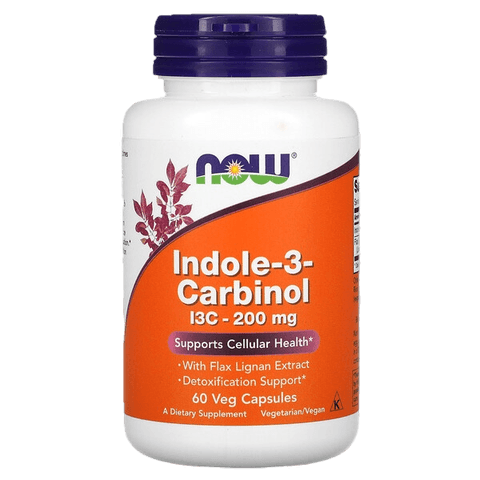Indole-3-Carbinol - Agora Alimentos
Indole-3-Carbinol - Agora Alimentos is backordered and will ship as soon as it is back in stock.
Description
Description
Indole-3-Carbinol Now
For anticarcinogenic action
Now's Indole-3-Carbinol helps prevent hormone-dependent cancers (breast cancer, prostate cancer, etc.). LinumLife™ Complex (flax seed extract). LinumLife™ is a patented formula rich in flax ligans (intensely researched for their phytoestrogenic effects) that provides flax ligans in concentrations 10 to 30 times higher than other extracts. Patented formula rich in high concentrations of flax ligans. Maintains a balanced estrogen/testosterone balance. Has antiproliferative, apoptotic, and antihypertensive properties.
Indole-3-Carbinol (I3C) is a sulfur-containing phytonutrient found in cruciferous vegetables, such as broccoli. Indole-3-Carbinol has a strong anti-carcinogenic effect, particularly against breast, uterine, and prostate cancer, by inhibiting the well-known 16-alpha hydroxyestrone, a type of estrogen that causes DNA damage and inhibits apoptosis (programmed cell death) in cancer cells, causing tumor cell proliferation and potentially metastasis. Indole-3-Carbinol also maintains a balanced estrogen/testosterone balance, making it essential for the endocrine system in both women and men. It is also a potent antioxidant and liver detoxifier, an effect enhanced by the addition of flax lignans. NOW guarantees complete stabilization of its indole-3-carbinol through cutting-edge production processes. I3C suppresses the proliferation of a wide range of tumors, including breast, prostate, colorectal, and myeloid leukemia, to varying degrees, and has recently demonstrated efficacy against adult T-cell leukemia/lymphoma (ATLL) (Aggarwal 2005, Machijima 2009). I3C inhibits the activation of several transcription factors, including NF-kappaB, Akt, SP1, estrogen receptor, androgen receptor, and Nrf2 (nuclear factor E2-related factor 2). This substance potentiates TRAIL (Tumor necrosis factor-Related Apoptosis-Inducing Ligand) through the induction of cell death receptors and enhances chemotherapy by reducing P-glycoprotein (P-gp) in the neoplastic cell membrane, the agent that removes the chemotherapeutic agent from the intracellular environment. It also has an anti-angiogenic effect. Antiangiogenics are therapeutic agents still in the preclinical and clinical research phase, which may be useful in
Treatment of malignant diseases (cancers, leukemias, sarcomas, primary bone marrow diseases) that depend on vascular neoformation (angiogenesis) for their growth and metastasis. These agents act more specifically than chemotherapy or radiotherapy, which constitute the classic therapies for malignant diseases. Due to their specificity, they are less toxic and better tolerated than chemotherapy/radiotherapy. The high fiber content of flaxseed is well known. The polysaccharides—gums and mucilages—in flaxseed may have nutritional value as dietary fiber, which appears to play an important role in reducing diabetes and the risk of cardiovascular disease, preventing colon and rectal cancer, and reducing the incidence of obesity.
I3C is a substance that decreases the mitochondrial membrane potential.
I3C is a potent chemopreventive agent in hormone-dependent neoplasms such as breast and prostate cancer. These effects are mediated by free radical suppression, inhibition of the formation of DNA-damaging carcinogens, stimulation of estrogen 2-hydroxylation (estrogen inactivation), inhibition of angiogenesis, and induction of apoptosis. Furthermore, it has strong hepatoprotective activity against several types of carcinogens due to p-450 enzyme induction (Safe-2008, Aggarwal-2005, Sarkar-2004, Manson-2005, Kim-2005, Naugler-2008, Mori-1999).
60 Capsules



